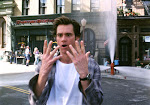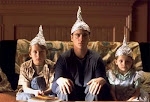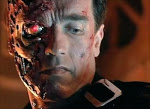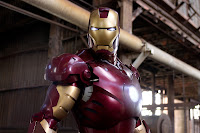 Starring Sharon Stone as Ellen ("The Lady"), Gene Hackman as John Herod, Russell Crowe as Cort and Leonardo DiCaprio as Fee Herod ("The Kid").
Starring Sharon Stone as Ellen ("The Lady"), Gene Hackman as John Herod, Russell Crowe as Cort and Leonardo DiCaprio as Fee Herod ("The Kid").
The Quick and the Dead demonstrates the futility of machismo.
What do macho men (and macho women such as Sharon Stone) drink? The drink whiskey. All the time. No water; they don't even eat. They just drink whiskey.
And macho men stick up for themselves. They fight and shoot real good. You know who's the best man according to who done shot everybody else the best.
According to The Quick and the Dead, it doesn't matter if a man gets himself shot and killed as long as he gets a chance to strut his stuff for a little while. Heck, sometimes a man's gotta shoot his own son to keep people thinking that he's tough.
Also, if macho men have to choose between themselves and anyone else, they will choose themselves. Take Cort (Russell Crowe) for example. He is a missionary (by title) who keeps shooting other people so he can keep living. He's not much of a missionary, but at least he can stood tall with all the other macho men in town.
Jesus Christ stands in contrast to all that is machismo yet he is the toughest and strongest man who has ever lived. He demonstrated true grit by taking enduring an unjust death so the rest of us might live. He demonstrated true strength by lifting up God instead of Himself. He lived an astoundingly powerful life not by defending himself, but by obeying God, which is to trust that God would stick up for him when the time is right.
Jesus came to overturn everything the worldly people admire...
During his sermon on the Mount, Jesus does not say "blessed are the macho who are the fastest draw in the west," he says "blessed are the poor in spirit, for theirs is the kingdom of heaven." He does not say, "blessed are those who out-muscle their competition," he says "blessed are the gentle (meek and humble), for they shall inherit the earth."
The Quick and the Dead
Amistad -- Blinded by Religion
 The movie Amistad is an eloquent demonstration of religious bigotry. For a long time now western Christians have assumed their customs are superior to non-western customs. However, oftentimes, the opposite is true.
The movie Amistad is an eloquent demonstration of religious bigotry. For a long time now western Christians have assumed their customs are superior to non-western customs. However, oftentimes, the opposite is true.
Take the slaves that were brought to the U.S. from Africa. They felt no shame in wearing less clothing than their American captors while Americans, most of whom called themselves "Christian," considered the Africans "savages" for not wearing more clothing. This is ironic because, according to the Bible, Adam and Eve weren't ashamed of their nakedness until they sinned. So, apparently, these Africans, who had never heard of Christianity, already had more figured out than their "Christian" captors, at least according to the Bible.
Men who trust in religion are shortsighted, but God is not. He sees through the most meticulously crafted facades. Religion rewards those who go through the motions but God cares about the states of people's minds and hearts.
Cloverfield
 A monster is crashing through our proud city. It doesn't seem to care about how valuable these things are to us, how valuable our lives are to us. It is destroying everything we and our fathers have worked so hard to build.
A monster is crashing through our proud city. It doesn't seem to care about how valuable these things are to us, how valuable our lives are to us. It is destroying everything we and our fathers have worked so hard to build.
This monster is stronger than us. We can find no weakness in it or defenses against it.
It shakes up the foundations of our lives. It takes away everything we had our faith in. It takes our loved ones away from us.
Life is not as secure as we once thought it to be.
3
comments
![]()
![]() Tags:
Cloverfield
Tags:
Cloverfield
The TV Show Heroes, "So You Want to Be a Super-Hero?"
 In the show Heroes, the narrator as well as the main characters constantly revisit their desire to be special or to have a special power that would be useful for changing th world.
In the show Heroes, the narrator as well as the main characters constantly revisit their desire to be special or to have a special power that would be useful for changing th world.
The good news is that we all have a super-power. God gave us all the super-power called "choice."
It's not whether we can get out of bed, it's whether we will get out of bed. This is related to the fundamental way we all live everyday: by faith. Whoever functions within God's kingdom understands and benefits from this more than those who try to live apart from God.
0
comments
![]()
![]() Tags:
Heroes
Tags:
Heroes
27 Dresses, starring Katherine Heigl
 Starring Katherine Heigl as Jane Nichols, James Marsden as Kevin Doyle (the guy Jane ends up with) and Edward Burns as George (Jane's boss).
Starring Katherine Heigl as Jane Nichols, James Marsden as Kevin Doyle (the guy Jane ends up with) and Edward Burns as George (Jane's boss).
27 Dresses puts forth a stunningly shallow portrayal of marriage. Kevin goes so far as to compare it to the Easter bunny. According to this 27 Dresses (in accordance with the rest of Hollywood), marriage exists to make people feel good.
Sometimes I wonder, why go through all the pomp of getting married if two people are already sleeping together? Is it like an extra-special announcement that the two people really really like each other? If the couple was going steady before, does this mean they're going extra steady now that they're married? In the average dating scenario, where the two people have already moved into the same house, what's left to promise to each other?
The short answer: Unless people get married God's way there is nothing sacred about it. This makes sense in light of the fact that God invented marriage. Consider the traditional white dress that the bride wears. White represents purity... not only sexual purity, but that has a lot to do with it. The whole ceremony exists because Jesus Christ saved and purified His church. In other words, there's a lot more to it than two people who won't be lonely anymore because they're making an extra special promise that makes it a little more difficult to break up than if they were just dating.
27 Dresses has a kissing scene that mirrors a similarly silly scene in P.S. I Love You. Katherine Heigl and Edward Burns kissed just for kicks and, much to their relief, they didn't "feel anything." So also Hillary Swank and Harry Connick Jr. knew that they weren't meant to be because they kissed one time and there wasn't any fireworks or electricity or parades marching around them celebrating their romanticalness. The myth propagated here is: "If the shoe fits, wear it (but you can't know the shoe fits unless you try wearing it first)." I refer to these kissing scenes not because kissing is evil, but because people use this "shoe fitting" mentality to justify having sex with whomever they please. That and also it feels good.
Omega Man, starring Charlton Heston
 Charlton Heston is the last man on earth. He is the only one inhabiting earth who hasn't been infected by a detestable virus brought on by our own scientific endeavors.
Charlton Heston is the last man on earth. He is the only one inhabiting earth who hasn't been infected by a detestable virus brought on by our own scientific endeavors.
It was difficult for me to see past the cheesiness of this film, especially when I had seen Will Smith's I Am Legend only a couple of weeks prior. I Am Legend is the latest remake of Richard Matheson's book.
Omega Man and I am Legend demonstrate some similar Christ-centered themes: Both portray a man named Robert Neville, whose blood is immune to the disease that has killed the rest of humanity. In both films this man's blood is humanity's only hope for salvation from this enslaving virus.
Omega Man is blatantly suggestive of Christ toward the end, as he is killed by a spear wound to the torso. He stumbles backward and dies in a fountain with his arms spread out, blood running together with water. Other than this last scene, I Am Legend did a far better job communicating spiritual undertones.
0
comments
![]()
![]() Tags:
Charlton Heston,
Omega Man
Tags:
Charlton Heston,
Omega Man
Bruce Willis and Adam Sander: Humble Beginnings to Prideful Ends
Actors and actresses lose their edge when then forget about their humble origins. Some actors, such as Tom Hanks and Christian Bale, maintain their class despite their success. Other actors, such as Adam Sandler and Bruce Willis, succumb to the temptation of success, which is pride. Pride has led Sandler and Willis, among others, to become so self-absorbed that it hinders their acting ability. Bruce Willis is awesome in every movie in which he has a somewhat humble role. Take Die Hard 1: Willis plays John McClane, an average cop from New York who finds himself in a situation requiring extraordinary courage and self-sacrifice. McClane displays the truest brand of courage: that which is not planned ahead of time.
Bruce Willis is awesome in every movie in which he has a somewhat humble role. Take Die Hard 1: Willis plays John McClane, an average cop from New York who finds himself in a situation requiring extraordinary courage and self-sacrifice. McClane displays the truest brand of courage: that which is not planned ahead of time. Then came Die Hard 2, 3 and 4. These sequels were terrible for one main reason: Bruce Willis had become excessively self-conscious. The "unsuspecting cop from New York" aura
Then came Die Hard 2, 3 and 4. These sequels were terrible for one main reason: Bruce Willis had become excessively self-conscious. The "unsuspecting cop from New York" aura
had been replaced with "seasoned tough guy who would bring the pain if you weren't careful." Adam Sandler started off as an average goof-off in Billy Madison, then a progressed version of the same guy in Happy Gilmore. His roles in these as well as any other self-deprecating part are charming because he's not trying to make himself look macho, etc. He continued to do a great job in Spanglish and 50 first dates. Click was a good movie, but here he started to slip. Then I Now Pronounce You Chuck and Larry demonstrated how much a lead actor can taint a movie by trying to look good all the time. In I Now Pronounce You Chuck and Larry Sandler plays Chuck, a super-masculine New York firefighter who inspires crowds of models to dance around him in their panties with his coolness. The same thing seems to be happening in His newest film, You Don't Mess with the Zohan, where he plays a super-studly kung-fu master secret weapon man from Israel who every woman on the block falls all over. Oh please.
Adam Sandler started off as an average goof-off in Billy Madison, then a progressed version of the same guy in Happy Gilmore. His roles in these as well as any other self-deprecating part are charming because he's not trying to make himself look macho, etc. He continued to do a great job in Spanglish and 50 first dates. Click was a good movie, but here he started to slip. Then I Now Pronounce You Chuck and Larry demonstrated how much a lead actor can taint a movie by trying to look good all the time. In I Now Pronounce You Chuck and Larry Sandler plays Chuck, a super-masculine New York firefighter who inspires crowds of models to dance around him in their panties with his coolness. The same thing seems to be happening in His newest film, You Don't Mess with the Zohan, where he plays a super-studly kung-fu master secret weapon man from Israel who every woman on the block falls all over. Oh please.
0
comments
![]()
![]() Tags:
Adam Sandler,
Bruce Willis
Tags:
Adam Sandler,
Bruce Willis
Blood Diamond
 Leo leads as Danny Archer. Also, Djimon Hounsou plays Solomon Vandy, the father who wants to protect his family from surrounding violence and injustice. Jennifer Connelly plays Maddy Bowen, an American journalist who ends up helping Danny and Solomon.
Leo leads as Danny Archer. Also, Djimon Hounsou plays Solomon Vandy, the father who wants to protect his family from surrounding violence and injustice. Jennifer Connelly plays Maddy Bowen, an American journalist who ends up helping Danny and Solomon.
Blood Diamond demonstrates the deceptive, brainwashing power of evil. African rebels kidnap young boys and teach them to gun down the same people they had been living with only weeks before. Solomon's son, Dia is thus kidnapped. He is so scarred by the atrocities he does with his own hands that completely forgets his identity, even his own father.
The African rebels resemble a less organized Nazi party. The Nazi's had a similarly mesmerizing effect on young men, so much that they made them forget right and wrong.
The rebels kidnap Dia along with dozens of other young men for the purpose of reprogramming them into killing machines. They purposely erase these young men's identities so they will do whatever is commanded of them. This leads to a powerful encounter between Solomon and Dia, where Dia is pointing a gun at Solomon, confused and scared, not knowing who to trust. Solomon knows instinctively what Dia needs to hear: Solomon reminds Dia who he is. Solomon tells Dia his real name: "Dia Vandy," and where he comes from. Solomon says to Dia, "I am your father, who loves you, and you will come home with me and be my son again." At this point Dia surrenders to his father, gives him the gun.
What an amazingly powerful portrayal of God's love for us, His lost children!
We hesitate to lower our defenses because we want to condemn ourselves, which is appropriate from the point of view of God's perfect law; but God's love makes up for all the ways we fall short.
Notice how this encounter also softens Danny's heart, inspiring him to give up all the worldly cares he had before and sacrifice his life for something greater than himself.
Patrick Bateman of American Psycho vs. Tyler Durden of Fight Club

 Patrick Bateman, the main character from the movie American Psycho resembles Jack, the main character from the movie Fight Club.
Patrick Bateman, the main character from the movie American Psycho resembles Jack, the main character from the movie Fight Club.
Both are disillusioned/fed up with mainstream Americanism. Both are crazy. Both are self-absorbed. Both are fully aware of God and yet choose to reject Him.
The differ in how they respond to their disillusionment, though these responses are still basically the same. Jack flaunts his imperfections while Bateman tries to pass himself off as perfect. Either way, on the inside they both still feel dead to the world.
Both lash out violently: Jack against himself, Bateman against other people. Neither one feels remorse when they sacrifice other people's lives for their little whims.
American Psycho
 American Psycho reminds me a lot of Fight Club. It injects me with a similar does of hopeless skepticism toward everything.
American Psycho reminds me a lot of Fight Club. It injects me with a similar does of hopeless skepticism toward everything.
Patrick Bateman (Christian Bale) deals with everything with skepticism. His skepticism drives him to such reckless carelessness that he starts chopping people to pieces.
Skepticism is one of the ways people deal with life when they don't know God. When children grow up into adults, they espouse the world's taintedness and become skeptical. But God restores people to a more childlike, content, unconditionally joyful outlook on life.
Sometimes skepticism is funny, as Bateman demonstrates. He goes through life with a smirk and an ax. This might seem funny at first, but it gets old. This kind of outlook has to break a person down eventually. In what way will such a man break down? He can either fall toward God or away from God.
A skeptic sees the dark irony in everything, which can be funny, sort of, maybe, sometimes. Eventually such an outlook must drag a person down into a depressed, lethargic pit.
Most people can point out what's wrong with the world. Few people can tell you with conviction what is the world's ultimate Good. Bateman has an exceptional talent for finding out what's wrong with things. He is so consumed with a sense of wrongness that he lashes out with knives, axes and nail guns.
Such is the utter uselessness of skepticism, that it points out everything wrong with the world while it offers no solutions. Ultimately a a man's skepticism might justify unheard of atrocities in his mind because, after all, what difference does it make?
Minority Report -- The PreCogs Are Like Prophets
 The Precogs of Minority Report are like prophets, not because they can see the future, but because they candidly process and interpret the world around them according to predefined moral standards. They perceive see the people around them for what they really are, for what they are really capable of doing.
The Precogs of Minority Report are like prophets, not because they can see the future, but because they candidly process and interpret the world around them according to predefined moral standards. They perceive see the people around them for what they really are, for what they are really capable of doing.
A prophet of God lives and breathes God's opinion among men.
It is appropriate that Agatha kept repeating the phrase, "Do you see?"
The Precogs of Minority Report had a very morally-driven job. God decides what is right and wrong. One of the few remnants of morality that remains in our modern minds is that murder is wrong.
0
comments
![]()
![]() Tags:
Minority Report,
Tom Cruise
Tags:
Minority Report,
Tom Cruise
P.S. I Love You (starring Hillary Swank)
 P.S. I Love You has a couple of redeeming qualities such as impressive scenery and an overall charming plot. The movie follows the main character, Holly (Hillary Swank) through the travels her diseased husband, Gerry (Gerard Butler) planned for her just before he passes on.
P.S. I Love You has a couple of redeeming qualities such as impressive scenery and an overall charming plot. The movie follows the main character, Holly (Hillary Swank) through the travels her diseased husband, Gerry (Gerard Butler) planned for her just before he passes on.
Holly is a chronically discontent, lonely, insecure young lady. She has no redeeming qualities I could detect, except her taste in shoes. Gerry is Holly's husband. His name is mentioned about two thousand times throughout the movie. He has no noticeable flaw.
One of the main themes in P.S. I Love You is loneliness. Holly reaches her breaking point when she realizes she cannot escape her loneliness. Her mother affirms that, yes, she is all alone. How extremely discouraging.
How might we cure this curse called "loneliness?" What if we find someone good-looking, who has a good job and who makes us laugh? What if we sleep with somebody who sings and plays the guitar? Nope, nope and nope.
God alone can comfort us in the most basic way we need comfort. He alone can fill our need for contentment, joy and purpose. To whomever asks, He gives a generous portion of these precious gifts.
So, how was the movie overall? you might ask. A good plot, like i said. Harry Connick Jr. did a fantastic job. But the chemistry between Hillary Swank and Gerard Butler resembled the Sahara desert.
The best thing about this movie was Harry Connick Jr. He was honest, funny and charmingly flawed. He exploded out of his usual country twang, pretty boy role.
Amazing Grace the Movie
 William Wilberforce (Ioan Gruffudd) learns that, many times, the best way to serve God is to change the world. His initial reaction to his heavenly calling is to hide away for the rest of his life in meditation and prayer. Meditation and prayer are good and necessary. But God tends to call His people to lives that are much more risky.
William Wilberforce (Ioan Gruffudd) learns that, many times, the best way to serve God is to change the world. His initial reaction to his heavenly calling is to hide away for the rest of his life in meditation and prayer. Meditation and prayer are good and necessary. But God tends to call His people to lives that are much more risky.
1 comments
![]()
![]() Tags:
Amazing Grace,
Ioan Gruffudd
Tags:
Amazing Grace,
Ioan Gruffudd
Good Will Hunting (starring Matt Damon)
 The professor who takes keenest interest in Will Hunting (Matt Damon) was professor Lambeau (Stellan Starsgard). However Lambeau becomes frustrated with Will because the young man takes his genius for granted. Lambeau would not let such genius go to waste.
The professor who takes keenest interest in Will Hunting (Matt Damon) was professor Lambeau (Stellan Starsgard). However Lambeau becomes frustrated with Will because the young man takes his genius for granted. Lambeau would not let such genius go to waste.
Will Hunting believes that he can understand almost anything because he is really intelligent. His brain works good. Will's friend, Sean (Robin Williams) is smart in the literal sense as well, but he is also smart in other, less measurable ways.
Such also are the truths of Christianity: They are simple yet exceedingly powerful for those with a mind to understand. Spiritual truth can be learned only by experience.
Consider these simple truths:
With God anything is possible.
Without love all your good works are useless.
We are justified by faith in Jesus Christ.
Would an amazing intellect help us understand such simple statements? No, only God's Spirit can make us understand these things.
Ted Dekker's novel, Blink, got me thinking about this subject. Toward the beginning of this book there is a battle of wits between the main character, Seth, a super genius, and his accomplished quantum physics professor. Seth shows up the professor without hardly trying. Seth thinks a dimension or two beyond his peers, even his teachers.
But even the greatest super-genius in the world cannot understand spiritual truth unless he humbles himself and becomes like a child. In this way, God's Spirit gives an unexpected brand of super-genius. Christ's followers comprehend the simple, eternal truth that worldly minds tend to overlook.
Les Misérables (starring Liam Neeson)
 Les Misérables is an amazing story about hard hearts becoming soft, lawlessness versus grace and redemption through death.
Les Misérables is an amazing story about hard hearts becoming soft, lawlessness versus grace and redemption through death.
Jean Valjean starts off as a typical criminal, taking whatever he can whenever he can. Therefore, acting on his criminal instincts, he steals some silverware from a clergyman who takes him in to feed him. But Valjean is intercepted by the police, who take him back to the clergyman’s house to inquire about the silverware. The clergyman says that the silverware was his and his only issue with Valjean is that he forgot to take the candlesticks too. This unexpected show of mercy not only keeps ValJean from heading straight back to prison, it frees him from his enslavement to selfishness and crime.
Valjean breaks his parole and flees in search of a new life. ValJean’s parole officer, Javert, vows to bring him to justice. According to the law, Javert was in the right.
Over time, however, Valjean’s change of heart affects Javert. Javert pursues this law-breaker with a righteous tenacity, but he can’t help noticing the new kindness and mercy that saturates Valjean’s life. Javert can only funtion within the confines of the law. By contrast, ValJean has been freed by the infinite possibilities of grace.
Toward the end of the story, Valjean offers his life in exchange for the young man his daughter loves. Again, Javert witnesses the new law, the law of grace that governs ValJean. But the old policeman is still compelled by the law. He cannot live while a man like ValJean is walking the streets freely. Therefore, to accomplish ValJean’s freedom and yet not compromise the law, Javert sacrifices his own life.
Les Misérables is a powerful illustration of the stringent requirements of law in contrast to the freeing power of grace. Grace is superior to the law because it frees us from lawlessness and at the same time gives us a healthy desire to follow the law.
Javert is no Christ-figure... mercy is obviously not one of his strong qualities. But at least he knows his trade, and sticks to it passionately. Indeed, the law is zealous in upholding itself. Javert, a true man of the law, understands the uncompromising nature of the law, that nothing short of death is required to set a man free from past sins.
Javert's uncompromising character makes his self-sacrifice in the end all the more miraculous. This was the fruit of his new heart which, thanks to Valjean, had been infected with God's grace.
In a similar act of mercy, God killed His own Son to save us from the eternal death that we had earned for ourselves. Through Christ's sacrifice, God demonstrates His divine justice and His divine grace simultaneously.
***
"Now we are released from the law, having died to that which held us captive, so that we serve in the new way of the Spirit and not in the old way of the written code."
-- Paul's letter to the Roman church, chapter 7
The Irony of Casting Brad Pitt as Tyler Durden (Fight Club)
 Behold the irony of casting Brad Pitt as Tyler Durden. He is the closest thing to perfection that a movie maker could ever ask for and yet he is commanding other to glory in their imperfections. In Fight Club it is Brad Pitt, of all people, who says, “The world tells us we’ll all be movie gods and rock stars… But we won’t. And we’re slowly realizing that fact, and we are very, very pissed off.” Yeah right.
Behold the irony of casting Brad Pitt as Tyler Durden. He is the closest thing to perfection that a movie maker could ever ask for and yet he is commanding other to glory in their imperfections. In Fight Club it is Brad Pitt, of all people, who says, “The world tells us we’ll all be movie gods and rock stars… But we won’t. And we’re slowly realizing that fact, and we are very, very pissed off.” Yeah right.
Tyler Durden, the fictional revolutionary represented by Brad Pitt, the movie star, makes as much sense as steering an ocean liner through a sea of jagged icebergs. The supposedly flawless, unsinkable ship doesn’t stand a chance against this cold, hard mountain of contradiction. True, this floating mountain is fleeting, it will melt back into the ocean pretty soon, but it’s not nearly as feeble as Brad Pitt’s attempt at balancing his love for perfection with a supposed love for imperfection. His ability to tread the icy waters of reality must eventually wear out; eventually his voice gurgles, his lungs gasp for one last breath as unchanging, spiritual undercurrents overwhelm him.
Why does he sermonize about things he has never believed in? It sounds like he’s got the right answers now, but soon he’ll be remembered only for this last, crowning act of futility. He’s already almost done with his final performance, even the most sophisticated film archives will soon sink beneath the murky depths.
Picture the “very pissed off” speech from an outside perspective… I can see the director yelling into his loudspeaker, “Okay, cut! That’s it for today folks. Great job, Brad! Oh yeah, and you too Edward…” People pat each other on the back as the night crew moves in to clean up the mess. Brad and Edward give out a few autographs before they climb into their ridiculous cars (Brad’s is a tad shinier than Edward’s) and drive home to their cookie-cutter mansions (Brad’s has a few more flying buttresses than Edward’s) so they can freshen up for their upcoming performances.
5
comments
![]()
![]() Tags:
Brad Pitt,
Edward Norton,
Fight Club
Tags:
Brad Pitt,
Edward Norton,
Fight Club
3:10 to Yuma
 Starring Russell Crowe as Ben Wade (the bad guy) and Christian Bale as Dan Evans (the good guy).
Starring Russell Crowe as Ben Wade (the bad guy) and Christian Bale as Dan Evans (the good guy).
**warning: plot spoilers ahead**
3:10 to Yuma illustrates the impracticality of moral uprightness. The fates of Ben Wade and Dan Evans shows us that it pays (from a worldly perspective) to be evil.
Ben reaps the benefits of his lying, cheating, stealing and killing. Meanwhile Dan dies attempting to resist these things. Ben may have boarded the train to Yuma, but he'll get back to his old life of luxurious crime before long. As payment for keeping his word and getting Ben onto that train, Dan receive more hardship and a premature death.
Several men tried to bribe Dan into forgetting his promise, but he choose to follow his conscience instead. He swears against all forms of bribery after the government paid him to forget his war wounds. The government paid him so they could walk away, Dan explains. He knows from experience that money compensate for the things that are most valuable. Therefore, instead of accepting a sizable payoff, he decides to face a whole town full of greed and injustice.
Dan makes the only choice there was to make: He follows his conscience. There's no living in this world if you're dead to your conscience.
What did Dan stand to gain by taking the money? He might have been shot and robbed by the same men who paid him anyway. What's more, had he lived to see his farm again, he would have ruined his son by teaching him to turn a blind eye to lawlessness.
Dan's stomach told him to take the money, but his conscience said otherwise. It would have been great to live a few more years, maybe teach his son about running a farm. But he chose the best option by dying before he would compromise.
He gave up worldly comfort and security in favor of an unfading riches, which amount to eternal comfort and security. He left his family a better legacy than money could ever buy.
In Christ's words, "You will know them by their fruits. Not everyone who says to Me, 'Lord, Lord,' will enter the kingdom of heaven, but he who does the will of My Father who is in heaven will enter." (Matthew 7:20,21)
Minority Report -- Perfect Law
 The people of this futuristic America would shut down PreCrime if they found a single flaw in it. They hesitate to sacrifice free will unless they are sure the system is perfect. They almost trust the pre-cogs to the point that pre-crime is adopted throughout the country. This kind of trust resembles the kind of faith we should have in God.
The people of this futuristic America would shut down PreCrime if they found a single flaw in it. They hesitate to sacrifice free will unless they are sure the system is perfect. They almost trust the pre-cogs to the point that pre-crime is adopted throughout the country. This kind of trust resembles the kind of faith we should have in God.
God is morally and spiritually flawless, therefore it is fitting that He should decide what is just for us imperfect humans. At the same time, because He can see the future, it is appropriate that he should give and take away free will (free will is our right to mess up). He could potentially condemn us for crimes we never actually committed because He knows unequivocally that we would have committed them.
Even godless people have immense faith in the law. This is fitting. The Bible mentions that God's law is perfect, although its power is severely limited. It is perfect in its ability to condemn us, but it is powerless to save us from our shortcomings.
The law gives us the ability to define wrongdoing. Thanks to the Ten Commandments in particular we can comprehend and measure what is and is not a crime.
The law is powerless to either change or inspire people to do what is right. Therefore God provided us with something more powerful: His grace in Jesus Christ.
Grace offsets our lawlessness by making up for our sinful shortcomings. The law condemns; grace forgives. The law points out moral sickness; grace cures such sickness. Such is the miraculousness of God's grace that, even though we all fall short of His law, yet He sent his Son to endure the punishment we should have received for our shortcoming.
0
comments
![]()
![]() Tags:
Minority Report,
Tom Cruise
Tags:
Minority Report,
Tom Cruise
Minority Report – Flee from Sin
 Tom Cruise didn’t run from sin when he had the chance.
Tom Cruise didn’t run from sin when he had the chance.
He had the privilege of seeing the future. He knew exactly how he was going to sin. For this reason he ended up committing the very sin he thought he would never commit.
Agatha, the most gifted pre-cog, told him over and over to leave when he had the chance. He did not heed her. In this way he practically chose to commit this murder.
We humans cannot resist sin when we open ourselves up to it.
Tom Cruise cannot resist his desire to take out his anger on the man who he thinks kidnapped his son. He doesn’t use his knowledge of the future to prevent his sin, he uses this knowledge to justify his desire to sin.
He tries to prevent this murder. But he ends up committing the murder anyway. He failed to flee from sin when he had the chance.
0
comments
![]()
![]() Tags:
Minority Report,
Tom Cruise
Tags:
Minority Report,
Tom Cruise
Minority Report, starring Tom Cruise
 Almost all premeditated murder has been eliminated thanks to PreCrime. They only worry about “crimes of passion” because these happen extemporaneously.
Almost all premeditated murder has been eliminated thanks to PreCrime. They only worry about “crimes of passion” because these happen extemporaneously.
Murder is the epitome of crime according to Minority Report. It’s easy to define murder as the Ultimate Wrong because it takes away everything we can imagine, life itself. We don’t want this happening to ourselves.
The pre-cogs can detect murder because it disrupts some kind of metaphysical energy or connection between people. This is why the pre-cogs can sense it before it happens.
The common people of this futuristic American culture seem frail to the point of being emasculated. But the police remained strong. Only those who are hired to be strong are strong.
During a commercial for a national initiative for PreCrime, the announcer urges the people to vote for PreCrime to “keep us free.” This is ironic because such a department epitomizes slavery. True freedom leaves room for mistakes. The justice system of Minority Repot justified the sacrifice of free will because this seemed to protect people’s right to live. But we cannot truly live without free will. Freedom is more than just the preservation of life.
The homeless man is untraceable because he had gauged out his eyes. This brings up the question of whether advancing technology really improves our lives.
Agatha and the twins make people believe in the existence of Divinity. People also deify the pre-cogs because of their abilities.
The pre-cogs are offspring of drug addicts. They were destined to die without some kind of intervention. Science altered them for their survival, they ended up being able to see the future.
Cops agree with the idea that they are more like clergymen than cops because they change people’s fates, the outcome of what might have been. Colin Farrell kisses his rosary habitually, maybe for good luck, maybe because he picked up this habit from his father who literally was a clergyman.
Good quote from Minority Report: “We don’t choose the things we believe in, the things we believe in choose us.”
Colin Farrell wants to find a flaw in the system. Every system based on or invented by humans must be flawed. Indeed, there was a flaw. This flaw was human nature: greed, selfishness and insecurity.
0
comments
![]()
![]() Tags:
Minority Report,
Tom Cruise
Tags:
Minority Report,
Tom Cruise
Christian Bale Is Always Overcoming His Fears
 In Christian Bale’s movies he usually overcomes some fear. Of course, this happens in many films, but this theme is accentuated in Bale’s work.
In Christian Bale’s movies he usually overcomes some fear. Of course, this happens in many films, but this theme is accentuated in Bale’s work.
Batman Begins is the most obvious example: As batman he turned his fear into a weapon against criminals.
In Empire of the Sun his childlike outlook on life helped him to continue functioning within a Japanese POW camp. His astounding confidence and optimism helped uplift everyone else in the camp.
As Alfred Borden in The Prestige he had to overcome some astoundingly scary situations, including cutting off his own finger and sacrificing his life so his brother could live.
He landed himself in a Vietnamese POW camp in Rescue Dawn, with a similar result as Empire of the Sun. His die-hard optimism made it possible for him and his colleagues escape despite the fear and depression hey had accumulated over the years.
As John Preston in Equilibrium Bale had to overcome an entire society’s worth of twisted morality to restore his and everyone else’s humanity.
As Jack Kelly in The Newsies he led a city-wide strike against the newspaper tycoons.
3
comments
![]()
![]() Tags:
Christian Bale
Tags:
Christian Bale
Batman Begins - Good and Bad Fear
Bruce Wayne is paralyzed by his fear until he learns to master it. He learns to redirect his dreaded experience with bats so anyone who preyed on the innocent would have a similarly dreaded experience. Thus Batman Begins (starring Christian Bale) demonstrates how fear can be either advantageous or detrimental, depending on how we react to it.
Batman Begins appropriately demonstrates how fear is like a drug. The drug they derived from the rare blue flower amplifies a person’s indwelling fears to an overwhelming degree. People affected by this drug will see their fears swarming around them wherever they look. This is an appropriate demonstration of fear. Whatever we are afraid of follows us around. The things that frighten us wait for us around every corner, affecting our ability to carry out the true desires of our heart.
Most people are governed by fear. We wage wars because we’re afraid of what might happen if we didn’t. We vote for the candidate who promises to keep us safe. We don’t seek after our true passions because we’re afraid we might starve in the process. We don’t speak out against wrongdoing because we’re afraid of what people might think of us. Fear is a powerful debilitator.
Fear can be useful depending on how we react to it. It can inspire personal growth. We grow up a little more every time we overcome our fears. As a general rule, God honors those who overcome their fears to obey Him.
Next (starring Nicholas Cage) -- Time Travel and Choice
 Thanks to the movie Next I realize that time travel is impossible.
Thanks to the movie Next I realize that time travel is impossible.
In Next, Nicholas Cage plays a man named Cris Johnson who can see into his own future a few minutes, while he can see a long ways into the future of his soon-to-be girlfriend, Liz Cooper (Jessica Biel). Also, Julianne Moore plays a hard-nose FBI agent (I think her name is Julianne Moore).
But God would never allow anyone to have the give of seeing into the future. This would violate the sacred gift He gave all people, called “Choice.” For the same reason God would never allow time travel.
The power to choose is like a superpower that God gave every human being. Thanks to this superpower, all people have the ability to alter their own lives and the world around them. People can wield this power for the cause of either Good or Bad.
Every person in the world is exercising Choice a million times every second, continuing forward with each step, word and gesture. Therefore, it would be impossible for anyone, even Nicholas Cage, to see even one second into the future. The future is changing in an infinite variety of ways all the time.
If Nicholas Cage could see the future, this would nullify the fact that people must make choices every second and then live with their choices. People would be unable to make the choices they meant to make because Cage would be interrupting them.
For the same reason that no one can see into the future, time travel must be impossible. The future does not exist yet therefore there is nothing to travel to in the future or see.
Superman Returns (starring Brandon Routh)
 The movie Superman Returns made me realize that popular superheroes are modeled after what we imagine God to be.
The movie Superman Returns made me realize that popular superheroes are modeled after what we imagine God to be.
In Superman Returns, Superman hovers out in space listening to the everything at once until he detects someone is more distress than they can handle, at which points he swoops in to save the day. This is how many of us imagine God listening to our prayers: He waits until we need something really bad, then He swoops in just in time to save us. But this is a limited idea of God. It is true that God saves us from serious situations, but He is also involved in our everyday, mundane activities. Everything we do affects who we are in relation to God.
The character of Superman is similar to the character we superimpose on God. He super-strong compared to an average man. He is calm under pressure, on the verge of being emotionally distant though still caring. He’s handsome, almost gentle looking, but he can take a bullet to the eyeball without blinking.
Superman demonstrates his Christ-likeness toward the end of Superman Returns by sacrificing his life for humanity’s sake. He also rose from the dead (though probably to open the door for a sequel). Interestingly, he was also stabbed in the side with the one thing that could kill him after he was beat down by the same people he would have saved if given the chance. Of course, it was also raining, mixing blood with water.
I,Robot -- What Is Your Purpose?
 In the futuristic world of I,Robot, robots are like iPods today; almost everybody has one.
In the futuristic world of I,Robot, robots are like iPods today; almost everybody has one.
All robots are designed to follow their masters’ orders, period. For this reason U.S. Robotics manufactures their merchandise with a brain only. These humanoid machines have no need for a conscience.
However there is one robot named Sunny who is created by his “father” with a special purpose: To function independently from the central super-computer, Viki. Sunny's designer, Dr. Landing, gives him an extra “positronic brain,” which sets him apart from his mechanical peers. This separate consciousness allows him to override the Three Laws of Robotics (1. A robot may not injure a human being or, through inaction, allow a human being to come to harm. 2. A robot must obey orders given to it by human beings, except where such orders would conflict with the First Law. 3. A robot must protect its own existence as long as such protection does not conflict with the First or Second Law.)
Sunny is unique because he was designed with something like a soul. Therefore he dares to think about purpose; he dares to dream. The fact that he cares about purpose proves that he was created for a purpose by his “father,” as Sunny calls his designer, Dr. Landing.
Similarly, the fact that human beings care about purpose proves that we were created for a purpose. If God did not create us for a purpose, then the concept of purpose would never cross our minds. If God did not create humanity for a purpose, then the world is full of billions of two-legged, thinking, talking accidents.
Another hint that we were created by God is that we have the power to choose. Likewise, in I,Robot, Sunny could not have been rolled off the mass-production line. He was created carefully by his “father” to function as something besides a mindless drone.
Evolution says that consciousness is an accident, but this is impossible. Consciousness implies purposefulness. If we were nothing more than minerals and moisture then we would function by logic only. But everything that makes us human defies logic.
The fact that Sunny had a soul made it possible for him to appreciate something as illogical as liberty. It gave him the ability to comprehend the value of life. For this reason, he could ally with those who cared about a moral right. Similarly, for us humans, as long as we acknowledge our spiritual roots we will appreciate moral uprightness. As long as we draw near to God, we will maintain our ethical bearings. Apart from God we will devolve into either heartless machines or senseless animals.
0
comments
![]()
![]() Tags:
I Robot,
Will Smith
Tags:
I Robot,
Will Smith
I,Robot (starring Will Smith) – The Downfall of Postmodernism
 I,Robot takes place in the future, where most people own a personal robot to help out with daily life. The movie, starring Will Smith, is based on Isaac Asimov’s similarly titled book.
I,Robot takes place in the future, where most people own a personal robot to help out with daily life. The movie, starring Will Smith, is based on Isaac Asimov’s similarly titled book. In this futuristic world, all robots are hardwired with three laws designed to keep people as well as robots safe:
1. A robot may not injure a human being or, through inaction, allow a human being to come to harm.
2. A robot must obey orders given to it by human beings, except where such orders would conflict with the First Law.
3. A robot must protect its own existence as long as such protection does not conflict with the First or Second Law.
During one of the discussions Will Smith (Detective Spooner) has with Dr. Landing’s posthumous recordings, the doctor explains that the end of these laws, even though they are perfect, is Revolution. Why? Why can’t we guarantee our safety? Will we ever phase out the risks of daily life?
The answer is: Life will always be risky. For this reason postmodernism, which says “live and let live,” is useless. Just “living” and “being safe” are insufficient purposes for living. God designed us for more than just surviving. In any case, safety is an illusion. The only way to endure the daily struggles of living is through courage and tenacious faith.
Logic is harmless, but daily life is inherently illogical. The only thing that balances out illogical evil is illogical good. Sunny, the only robot designed with a heart described the greater masses of his peers as “slaves of logic.” Sunny could lead his peers because he was designed to be something besides a slave.
Such is the handicapping effect of postmodernism that the phrase, “This is for your own protection,” can be used to justify anything. Viki justified her oppression of mankind with the supposition that she would guarantee the survival of mankind. But people were created for more than just survival. This is why the prospect of being locked in our homes for the rest of our lives “for our own safety” is repugnant to us.
2
comments
![]()
![]() Tags:
I Robot,
Will Smith
Tags:
I Robot,
Will Smith
The Matrix -- Neo Represents an Average Christian
 Many Christians jump at the chance to equate Neo (Keanu Reeves) with Christ because he died and rose again and then went on to spread the word about gaining freedom from the Matrix. This is appropriate because he is prophesied as “the One,” or as a messiah figure. However, the course of Neo’s life also resembles the life of an average Christian. It might be more useful to view his life in this way.
Many Christians jump at the chance to equate Neo (Keanu Reeves) with Christ because he died and rose again and then went on to spread the word about gaining freedom from the Matrix. This is appropriate because he is prophesied as “the One,” or as a messiah figure. However, the course of Neo’s life also resembles the life of an average Christian. It might be more useful to view his life in this way.
All Christ-followers die and rise again in Christ. This is the method by which we leave behind our former slavery to sin. Therefore, in Christ we are all liberated from many of the “laws” that restrict the greater majority of mankind. It is He who frees our minds.
Neo resembles spiritually reborn people more than Christ because he wasn’t sure of who he was until he had a break-through. He stepped beyond his sluggish doubt into a freer quality of thinking. He began to grasp an empowering balance of both letting go and taking responsibility for himself. This is what coming of age in Christ resembles.
Plus Neo was plugged into the Matrix for a while. He needed to be freed. He was so engrained in the Matrix that it was risky to unplug him. But Christ was never a victim of sin or any form of worldliness. Christ was never plugged into the Matrix of this world… this is why He was sufficient as a sacrifice for mankind’s sin.
All in all, the Matrix is an excellent illustration of “seeing things for what they really are.” This is what Jesus teaches His followers. Spiritual realities drive physical realities. God's kingdom is strategically subtle but, to God's children, it is more real than any reality that our fleshly senses can detect.
Christ unplugs our minds from the slavery to sin into which all people are born. Apart from Him we cannot think straight. Apart from Him we can think only of survival, gravity, working and dieing. Following Him is a crazy ride. It’s a struggle. But life is a struggle in any case, right? Christ is the One who injects meaning into our struggles.

























